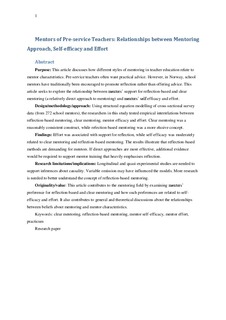Mentors of preservice teachers: The relationships between mentoring approach, self-efficacy and effort
Journal article, Peer reviewed
Accepted version

Åpne
Permanent lenke
http://hdl.handle.net/11250/2595057Utgivelsesdato
2018Metadata
Vis full innførselSamlinger
- Institutt for lærerutdanning [3582]
- Publikasjoner fra CRIStin - NTNU [38062]
Originalversjon
International Journal of Mentoring and Coaching in Education. 2018, 7 (3), 261-279. 10.1108/IJMCE-12-2017-0076Sammendrag
Purpose
The purpose of this paper is to discuss how different styles of mentoring in teacher education relate to mentor characteristics. Pre-service teachers often want practical advice. However, in Norway, school mentors have traditionally been encouraged to promote reflection rather than offering advice. This study seeks to explore the relationship between mentors’ support for reflection based and clear mentoring (a relatively direct approach to mentoring) and mentors’ self-efficacy and effort.
Design/methodology/approach
Using structural equation modelling of cross-sectional survey data (from 272 school mentors), the researchers in this study tested empirical interrelations between reflection-based mentoring, clear mentoring, mentor efficacy and effort. Clear mentoring was a reasonably consistent construct, while refection-based mentoring was a more elusive concept.
Findings
Effort was associated with support for reflection, while self-efficacy was moderately related to clear mentoring and reflection-based mentoring. The results illustrate that reflection-based methods are demanding for mentors. If direct approaches are more effective, additional evidence would be required to support mentor training that heavily emphasises reflection.
Research limitations/implications
Longitudinal and quasi-experimental studies are needed to support inferences about causality. Variable omission may have influenced the models. More research is needed to better understand the concept of reflection-based mentoring.
Originality/value
This paper contributes to the mentoring field by examining mentors’ preference for reflection based and clear mentoring and how such preferences are related to self-efficacy and effort. It also contributes to general and theoretical discussions about the relationships between beliefs about mentoring and mentor characteristics.